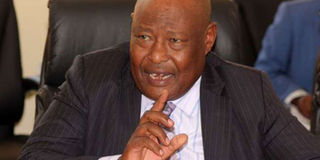Unease rife in surge of political gangs

NCIC chairman Francis Ole Kaparo before a parliamentary committee at Parliament Buildings on October 6, 2016. He has said the government needs to do more to promote harmony. PHOTO | DENNIS ONSONGO | NATION MEDIA GROUP
What you need to know:
- On Wednesday, police in Kisumu had to fire in the air after youth stormed the County Assembly to stop what they said was a secret impeachment plan against Governor Jack Ranguma.
- And in Mombasa Kisauni MP Rashid Bedzimba was recently forced to defend himself against claims he is behind the rise of the notorious Wakali Kwanza and Wakali Wao gangs.
A sudden surge in politically motivated violence and the resurgence of criminal gangs in recent months is raising concern about the country’s state of security 11 months to the General Election.
The stakes are high and it appears more and more politicians are recruiting gangs, mostly under the disguise of being rowdy supporters, to do political work for them, creating fear of a repeat of the post-2007 election violence.
The situation has been complicated by the early campaigns especially in areas that competition for elective positions is expected to be tough with clashes between supporters of politicians becoming a common thing.
On Wednesday, police in Kisumu had to fire in the air after youth stormed the County Assembly to stop what they said was a secret impeachment plan against Governor Jack Ranguma.
The crowd, which tried to force its way into the Assembly chambers, wanted the Speaker to recall four MCAs who had been suspended over misconduct.
It is not clear who was behind the group or if the protests were spontaneous.
But while violence appear isolated, most seem to follow the scary trend of post-2007 where politicians recruited gangs to protect their turfs, eventually contributing to the worst violence linked to an election in Kenya’s history.
“We cannot pretend everything is alright because the trends are worrying; it is frustrating,” Francis ole Kaparo, the chair of the National Cohesion and Integration Commission, told the Sunday Nation.
“Those involved have a feeling the law is not there because they don’t feel its full force, while the politicians know the police will take forever or will never investigate,” he said.
In Murang’a County last month, rival groups — one, with well-built members clad in black suits — clashed over the opening of parallel Jubilee Party offices in Kandara.
Television footage showed the men beating up a rival.
MCA ASSAULTED
And while gangs have all along existed in urban areas, mostly acting as vigilantes providing security in the absence of the police, the tendency by politicians to hire them as foot soldiers is worrying the authorities.
Last month, a rally organised by the Water Cabinet Secretary Eugene Wamalwa, who wants to be Nairobi governor, was cut short after Nairobi Senator Mike Sonko stormed the event accompanied by rowdy youths.
While the disruption seemed like a normal day in the office for the aspirants, residents of Dandora say a new gang known as “Sila” is increasingly being used by politicians.
In Western Kenya, some of the groups alleged to have made a resurgence include Marachi Republican Council, Mossad, Bulanda Boys and the Men in Black.
“We are monitoring the situation in the counties so that we can come up with measures to deal with politicians hiring gangs,” regional police chief Moses Ombati told the Sunday Nation.
Confrontations between supporters of rival politicians erupting at funerals and campaign rallies have become frequent.
In Western Kenya, Mahiakalo ward representative Cleophas Malala, who is a fierce critic of Governor Wycliffe Oparanya, wants people he claims are linked to the county government arrested for allegedly assaulting him during a funeral.
“Investigations into my complaint are yet to be completed for lack of a certified video footage of the incident,” says the MCA.
And in Mombasa Kisauni MP Rashid Bedzimba was recently forced to defend himself against claims he is behind the rise of the notorious Wakali Kwanza and Wakali Wao gangs.
He threatened to sue anyone linking him to the criminals.
Coast Regional Coordinator Nelson Marwa claims the gangs have been formed to disrupt the upcoming elections and that a local politician is funding them.
“We have information that a leader in Kisauni is mobilising gangs to deal with certain individuals. It has taken some time but he will be arrested soon,” said Mr Marwa.
HAPLESS YOUTH
Experts cite lack of appropriate mechanisms to prosecute those behind the 2007 post-election violence and the intense competition expected.
“The indecision created by the government on prosecuting the perpetrators of the 2007 crisis plus the collapse of the International Criminal Court cases sent a message that politicians can use violence as a means to get elected and nothing will happen to you,” says Patrick Magero, a conflict and peace studies lecturer at the United States International University-Africa.
“And given the animosity between ethnic groups and political parties plus the lack of jobs for the youth means there are enough ingredients to spark another post-election violence.
"Kenyans need to ask themselves why the Mungiki have suddenly resurfaced in Nakuru and Kiambu and who is behind it,” he says.
During his weekly briefing, government spokesman Eric Kiraithe said, “There are circles that would wish for violence and chaos to avoid a legitimate defeat in a free and fair democratic election.”
He warned: “We wish to reiterate that there is no-one in Kenya above the law, and any person attempting to use violence to achieve political objectives will be dealt with firmly.”





